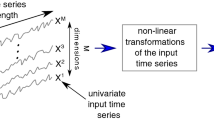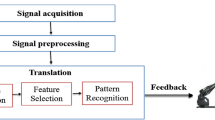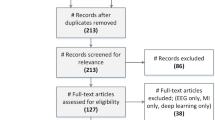Abstract
Physiological signal based biometric analysis has recently attracted attention as a means of meeting increasing privacy and security requirements. The real-time nature of an electrocardiogram (ECG) and the hidden nature of the information make it highly resistant to attacks. This paper focuses on three major bottlenecks of existing deep learning driven approaches: the lengthy time requirements for optimizing the hyperparameters, the slow and computationally intense identification process, and the unstable and complicated nature of ECG acquisition. We present a novel deep neural network framework for learning human identification feature representations directly from ECG time series. The proposed framework integrates deep bidirectional long short-term memory (BLSTM) and adaptive particle swarm optimization (APSO). The overall approach not only avoids the inefficient and experience-dependent search for hyperparameters, but also fully exploits the spatial information of ordinal local features and the memory characteristics of a recognition algorithm. The effectiveness of the proposed approach is thoroughly evaluated in two ECG datasets, using two protocols, simulating the influence of electrode placement and acquisition sessions in identification. Comparing four recurrent neural network structures and four classical machine learning and deep learning algorithms, we prove the superiority of the proposed algorithm in minimizing overfitting and self-learning of time series. The experimental results demonstrated an average identification rate of 97.71%, 99.41%, and 98.89% in training, validation, and test sets, respectively. Thus, this study proves that the application of APSO and LSTM techniques to biometric human identification can achieve a lower algorithm engineering effort and higher capacity for generalization.
摘要
随着日益增长的个人隐私和安全需求, 基于生理信号的生物识别技术近年受到越来越多关注. 心电信号 (electrocardiogram, ECG) 的活体采集性和信息隐蔽性使其具有极强抗攻击性. 本文针对现有深度学习算法在心电身份识别领域应用中面临的3个主要瓶颈——超参数寻优费时、 识别过程缓慢且计算量大、 心电采集环境复杂且不稳定, 提出一种新的深度神经网络框架, 集双向长短期记忆网络 (BLSTM) 和自适应粒子群优化算法 (APSO) 于一体, 直接从时序信号中学习待识别个体的关键特征表示. 该方法避免了超参数选择寻优效率低下且依赖于经验设定的不足, 充分利用时序信号的空间信息特征和识别算法对关键特征的记忆特性. 为评估算法性能, 设计了两种方案模拟个体ECG采集过程中的电极放置位置和采集时间连续性. 经4种LSTM网络模型和机器学习算法的实验对比分析, 证实所提算法在抑制过拟合和特征自学习方面存在一定优势, 训练集、 验证集和测试集的平均识别率分别为97.71%、 99.41%和98.89%. 实验结果表明, 本文所提算法具有计算量小、 泛化性能高的优势, 可有效应用于个体身份识别.
Similar content being viewed by others
Data availability
The data used in this work is publicly available from https://archive.physionet.org/challenge/2011/ and https://physionet.org/content/ecgiddb/1.0.0/.
References
Agrafioti F, Hatzinakos D, 2008. ECG based recognition using second order statistics. Proc 6th Annual Communication Networks and Services Research Conf, p.82–87. https://doi.org/10.1109/CNSR.2008.38
Ahmadi A, Mitchell E, Richter C, et al., 2015. Toward automatic activity classification and movement assessment during a sports training session. IEEE Int Things J, 2(1):23–32. https://doi.org/10.1109/JIOT.2014.2377238
Bassiouni MM, El-Dahshan ESA, Khalefa W, et al., 2018. Intelligent hybrid approaches for human ECG signals identification. Signal Image Video Process, 12(5):941–949. https://doi.org/10.1007/s11760-018-1237-5
Biel L, Pettersson O, Philipson L, et al., 2001. ECG analysis: a new approach in human identification. IEEE Trans Instrum Meas, 50(3):808–812. https://doi.org/10.1109/19.930458
Choi GH, Bak ES, Pan SB, 2019. User identification system using 2D resized spectrogram features of ECG. IEEE Access, 7:34862–34873. https://doi.org/10.1109/ACCESS.2019.2902870
Chu YF, Shen HB, Huang KJ, 2019. ECG authentication method based on parallel multi-scale one-dimensional residual network with center and margin loss. IEEE Access, 7:51598–51607. https://doi.org/10.1109/ACCESS.2019.2912519
da Silva Luz EJ, Moreira GJP, Oliveira LS, et al., 2018. Learning deep off-the-person heart biometrics representations. IEEE Trans Inform Forens Secur, 13(5):1258–1270. https://doi.org/10.1109/TIFS.2017.2784362
Hochreiter S, Schmidhuber J, 1997. Long short-term memory. Neur Comput, 9(8):1735–1780. https://doi.org/10.1162/neco.1997.9.8.1735
Labati RD, Muñoz E, Piuri V, et al., 2019. Deep-ECG: convolutional neural networks for ECG biometric recognition. Patt Recogn Lett, 126:78–85. https://doi.org/10.1016/j.patrec.2018.03.028
Liu JK, Yin LY, He CG, et al., 2018. A multiscale autoregressive model-based electrocardiogram identification method. IEEE Access, 6:18251–18263. https://doi.org/10.1109/ACCESS.2018.2820684
Nuno B, Belo D, Gamboa H, 2020. ECG biometrics using spectrograms and deep neural networks. Int J Mach Learn Comput, 10(2):259–264. https://doi.org/10.18178/ijmlc.2020.10.2.929
Oh SL, Ng EYK, Tan RS, et al., 2018. Automated diagnosis of arrhythmia using combination of CNN and LSTM techniques with variable length heart beats. Comput Biol Med, 102:278–287. https://doi.org/10.1016/j.compbiomed.2018.06.002
Palaniappan R, Krishnan SM, 2004. Identifying individuals using ECG beats. Proc Int Conf on Signal Processing and Communications, p.569–572. https://doi.org/10.1109/SPCOM.2004.1458524
Pan JP, Tompkins WJ, 1985. A real-time QRS detection algorithm. IEEE Trans Biomed Eng, 32(3):230–236. https://doi.org/10.1109/TBME.1985.325532
Rodriguez A, Laio A, 2014. Clustering by fast search and find of density peaks. Science, 344(6191):1492–1496. https://doi.org/10.1126/science.1242072
Salloum R, Kuo CCJ, 2017. ECG-based biometrics using recurrent neural networks. Proc IEEE Int Conf on Acoustics, Speech and Signal Processing, p.2062–2066. https://doi.org/10.1109/ICASSP.2017.7952519
Srivastava N, Hinton G, Krizhevsky A, et al., 2014. Dropout: a simple way to prevent neural networks from overfitting. J Mach Learn Res, 15(1):1929–1958.
Tantawi MM, Revett K, Salem AB, et al., 2015. A wavelet feature extraction method for electrocardiogram (ECG)-based biometric recognition. Signal Image Video Process, 9(6):1271–1280. https://doi.org/10.1007/s11760-013-0568-5
Wu B, Yang GP, Yang L, et al., 2018. Robust ECG biometrics using two-stage model. Proc 24th Int Conf on Pattern Recognition, p.1062–1067. https://doi.org/10.1109/ICPR.2018.8545285
Yildirim Ö, 2018. A novel wavelet sequence based on deep bidirectional LSTM network model for ECG signal classification. Comput Biol Med, 96:189–202. https://doi.org/10.1016/j.compbiomed.2018.03.016
Yu JR, Si YJ, Liu X, 2017. ECG identification based on PCA-RPROP. Proc 8th Int Conf on Digital Human Modeling and Applications in Health, Safety, Ergonomics and Risk Management, p.419–432. https://doi.org/10.1007/978-3-319-58466-9_37
Zhang QX, Zhou D, Zeng X, 2017. HeartID: a multiresolution convolutional neural network for ECG-based biometric human identification in smart health applications. IEEE Access, 5:11805–11816. https://doi.org/10.1109/ACCESS.2017.2707460
Zhao ZD, Zhang YF, Deng YJ, et al., 2018. ECG authentication system design incorporating a convolutional neural network and generalized S-transformation. Comput Biol Med, 102:168–179. https://doi.org/10.1016/j.compbiomed.2018.09.027
Author information
Authors and Affiliations
Contributions
Yefei ZHANG and Zhidong ZHAO designed the research. Yanjun DENG and Xiaohong ZHANG processed the data. Yefei ZHANG and Zhidong ZHAO drafted the manuscript. Yu ZHANG helped organize the manuscript. Yefei ZHANG and Zhidong ZHAO revised and finalized the paper.
Corresponding author
Ethics declarations
Yefei ZHANG, Zhidong ZHAO, Yanjun DENG, Xiao-hong ZHANG, and Yu ZHANG declare that they have no conflict of interest.
Additional information
Project supported by the Zhejiang Province Public Welfare Technology Application Research Project (No. LGG20F010008), the National Natural Science Foundation of China (No. 61571173), and the Welfare Project of the Science Technology Department of Zhejiang Province, China (No. LGG18F010012)
Rights and permissions
About this article
Cite this article
Zhang, Y., Zhao, Z., Deng, Y. et al. ECGID: a human identification method based on adaptive particle swarm optimization and the bidirectional LSTM model. Front Inform Technol Electron Eng 22, 1641–1654 (2021). https://doi.org/10.1631/FITEE.2000511
Received:
Revised:
Accepted:
Published:
Issue Date:
DOI: https://doi.org/10.1631/FITEE.2000511
Key words
- ECG biometrics
- Human identification
- Long short-term memory (LSTM)
- Adaptive particle swarm optimization (APSO)




